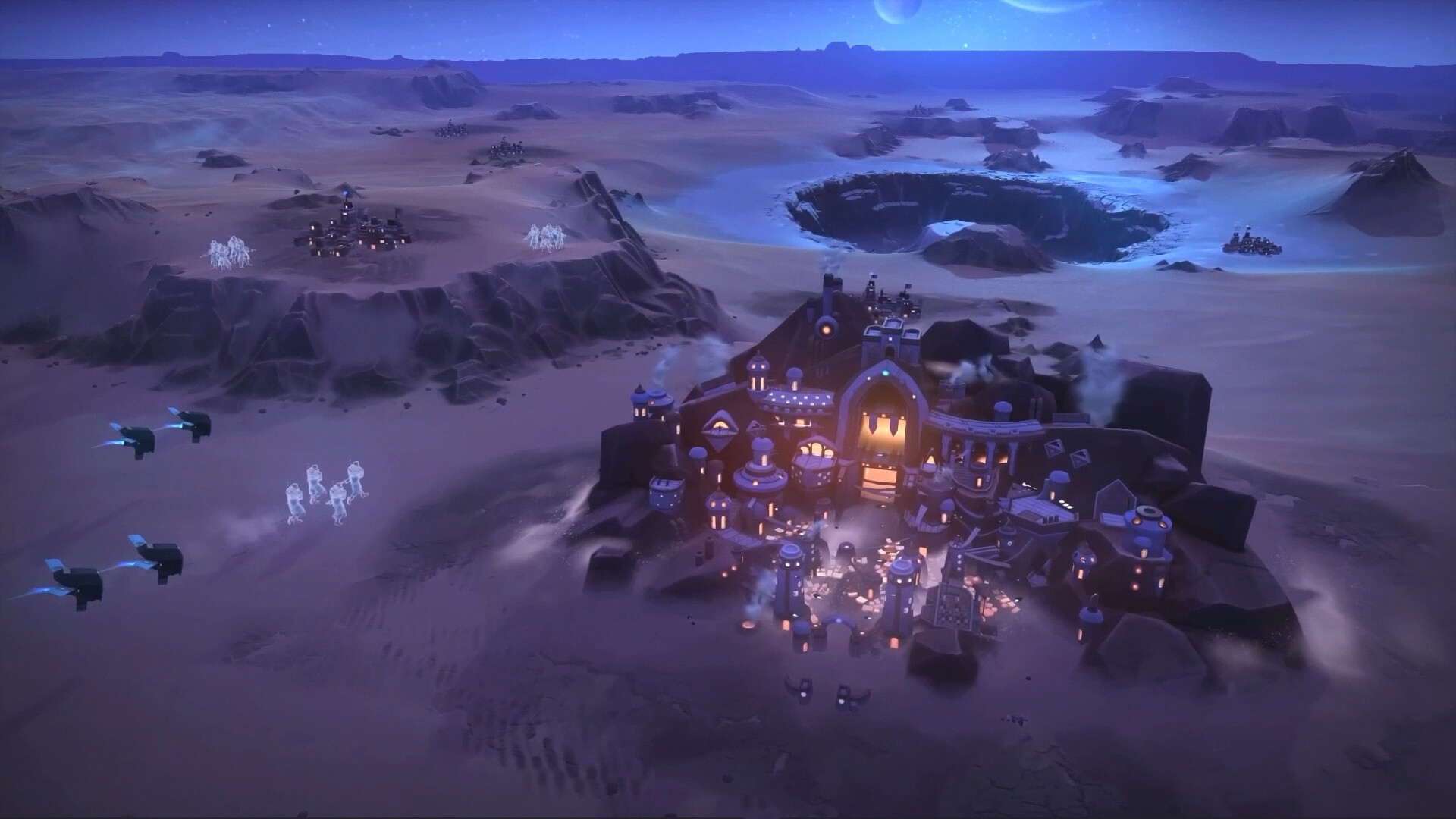TechRadar Verdict
A competent strategy outing, Dune: Spice Wars provides a range of strategic systems that offer engaging decision points for players. However, without a narrative campaign, options for play are limited, and immersion into this classic sci-fi setting is held back by samey environments and shallow combat.
Pros
- +
Excellent strategy fundamentals with interlocking systems
- +
Faithfully recreates the beloved Dune setting
- +
Diverse factions that meaningfully alter the experience
Cons
- -
No fleshed-out campaign mode
- -
Bare-bones tutorials
- -
Shallow combat mechanics
Why you can trust TechRadar
Platform reviewed: PC
Available on: PC
Release date: September 14, 2023
Don't be fooled by the real-time movement, or the Ornithopters gliding over endless desert. Dune: Spice Wars is a 4X, and you'll be doing plenty of exploration, expansion, exploitation and extermination. However, the scale has been shrunk down, with the self-contained power struggles brewing between the factions marching towards broad conflicts that Spice Wars can't quite deliver.
Set in the universe of Frank Herbert's Dune, Spice Wars follows the struggle for Arrakis, a desert planet rich in Spice - a mysterious resource vital for interstellar travel. Interstellar noble houses, smugglers, and locals alike have descended to the world in an effort to stake their claims to this valuable substance. Economies and armies clash across the hostile desert environment. Dehydration is a constant danger for your soldiers, as are the gargantuan roving sandworms that threaten to consume any who would get in their way. As your chosen faction ranges across the desert, you’ll encounter local villages that you’ll bring to heel, either through diplomacy or, more likely, bloodshed.
In the midst of all of this, you'll have to navigate the Byzantine imperial bureaucracy, complete with taxation, policy meetings, and even a stock market with fluctuating share prices influenced by player action. Spice Wars is a game with lots of rules, and you'll need to learn them if you want to succeed.

As your struggle reaches a crescendo, you’ll need to use economic might, political nous, espionage, or good old-fashioned military power to win the day as you and your rivals race to fulfill one of the many victory conditions on offer. You can assassinate your enemies for an espionage victory or get elected governor of Arrakis for a political victory. You can buy controlling shares in the Spice market for an economic victory or just dominate the land for a traditional victory-point-based win. Lastly, there’s the classic military victory, if you’re more of a "shoot-first" kind of ruler.
Dune: Spice Wars falls short of many of its contemporaries
Three modes are available: a 1v1 dueling mode, a more open 4v4 battle or conquest mode, which is the closest that Dune: Spice Wars comes to a campaign. Unfortunately, conquest mode offers little more than a few bonus objectives and passive buffs to acquire between battles. Though it adds a semblance of structure, it is not an adequate substitute for a long-form single-player campaign.
With no structured narrative campaign to speak of, Spice Wars relies on emergent storytelling which, though certainly present, is undercut by the fact that games are over in a matter of hours. Without the sprawling campaigns of the likes of Total War: Warhammer 3, Stellaris, or Crusader Kings 3, Dune: Spice Wars falls short of many of its contemporaries.
Sandstorm in a teacup
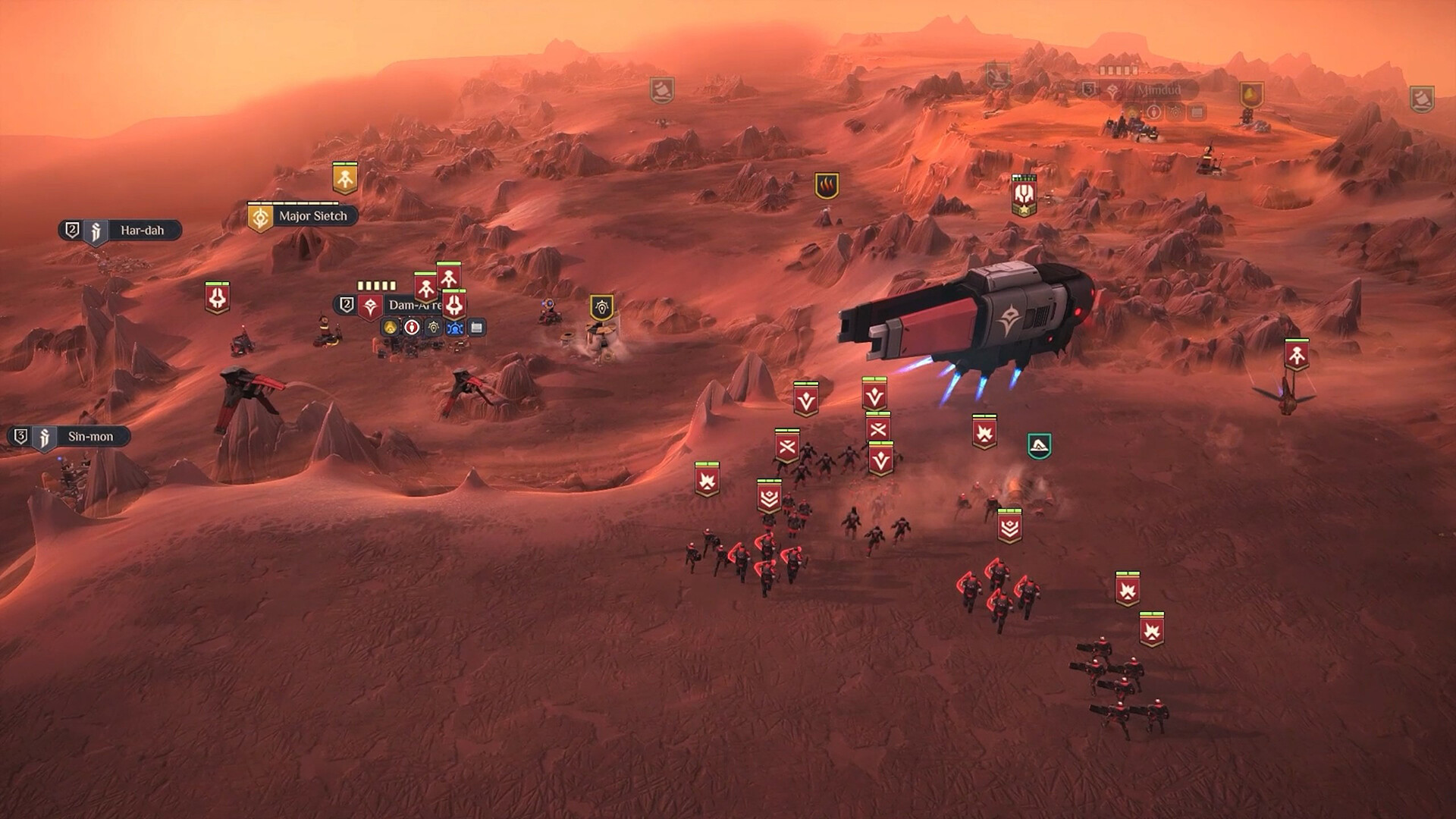
Though Dune: Spice Wars boasts an array of impressive systems for espionage, politics, research, and settlement development, it does little to introduce players to the tools at their disposal.
Sign up for breaking news, reviews, opinion, top tech deals, and more.
The five tutorial missions offer pared-down explanations for how to extract resources and improve settlements, but the internecine political tensions of the Landsraad - the body that regulates the factions’ struggle for power on Arrakis - or the game’s tantalizingly cutthroat espionage system remain off-limits as far as these introductions are concerned. The secrets of these systems are only revealed through trial and error in a proper match.
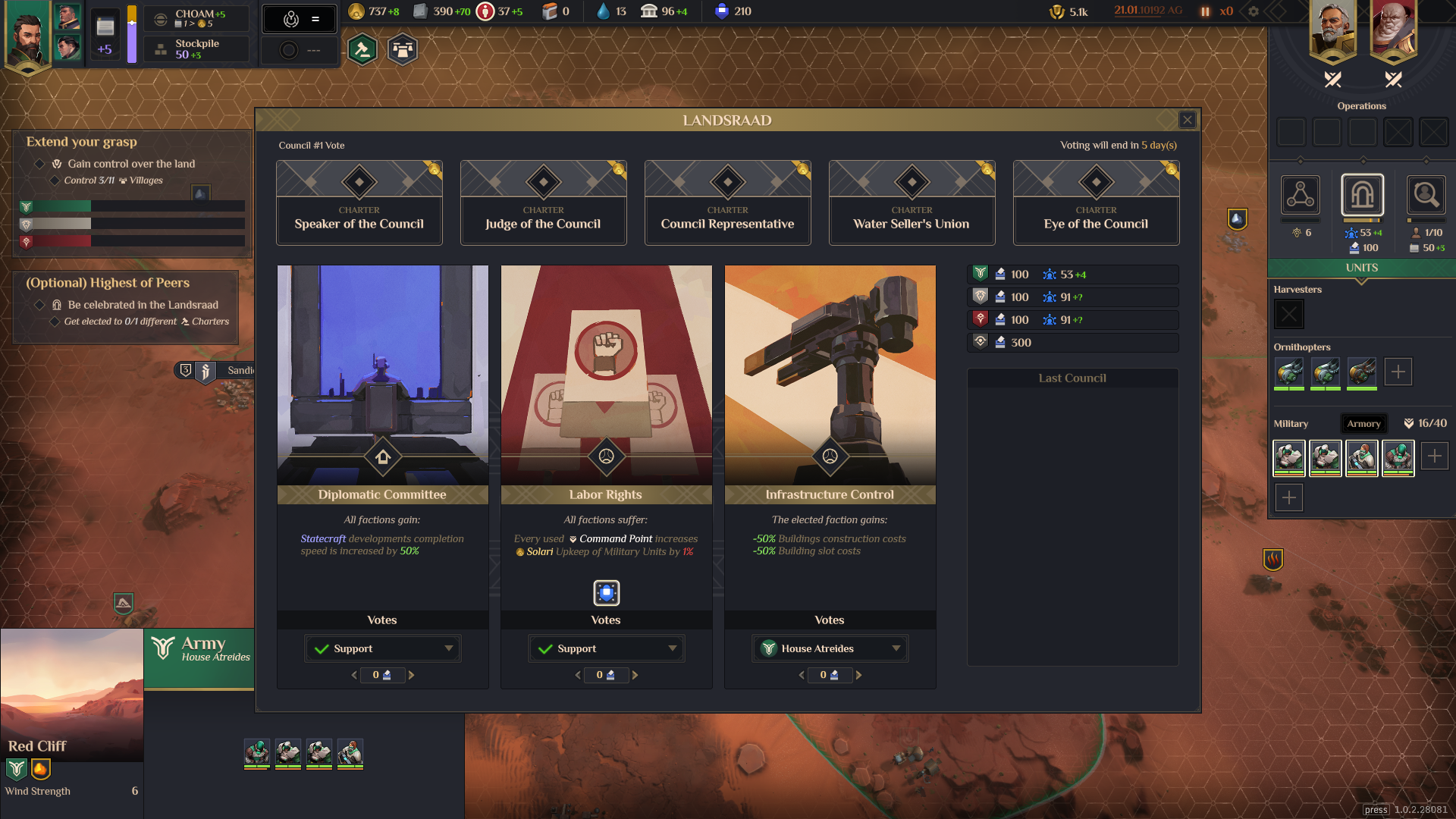
The regular meetings of the Landsraad council give games of Spice Wars a constant sense of political tension, particularly when it comes to being elected to one of the council’s Charters. Getting elected to the Eye of the Council during my first playthrough felt like a watershed moment, not only serving as the culmination of hours of political scheming but also giving me access to a delightful new array of espionage-focused toys.
This intimidating undertaking is made all the more difficult by the dizzying array of different resources on offer. For those unfamiliar with the Dune setting, it won’t be immediately obvious what the likes of “Spacing Guild Favors” and “CHOAM Shares” actually do. It’s a testament to the strong fundamentals on display in Spice Wars that the different assets on offer usually perform roles within the wider game that are often easy to intuit. However, this isn’t always the case. While full of helpful tooltips, the game doesn’t always offer them in contexts where they’re sorely needed.
It took me several hours to work out how Influence could be converted into Landsraad votes, allowing you to shape policy with game-wide buffs and debuffs. Once I unpicked the system it was a blast to muck around with. Since I’d gone for a high-influence build, I could easily saddle my rivals with unwanted tariffs and imperial scrutiny. However, I wish all of these fun political tools had been explained to me in a tutorial at the beginning.
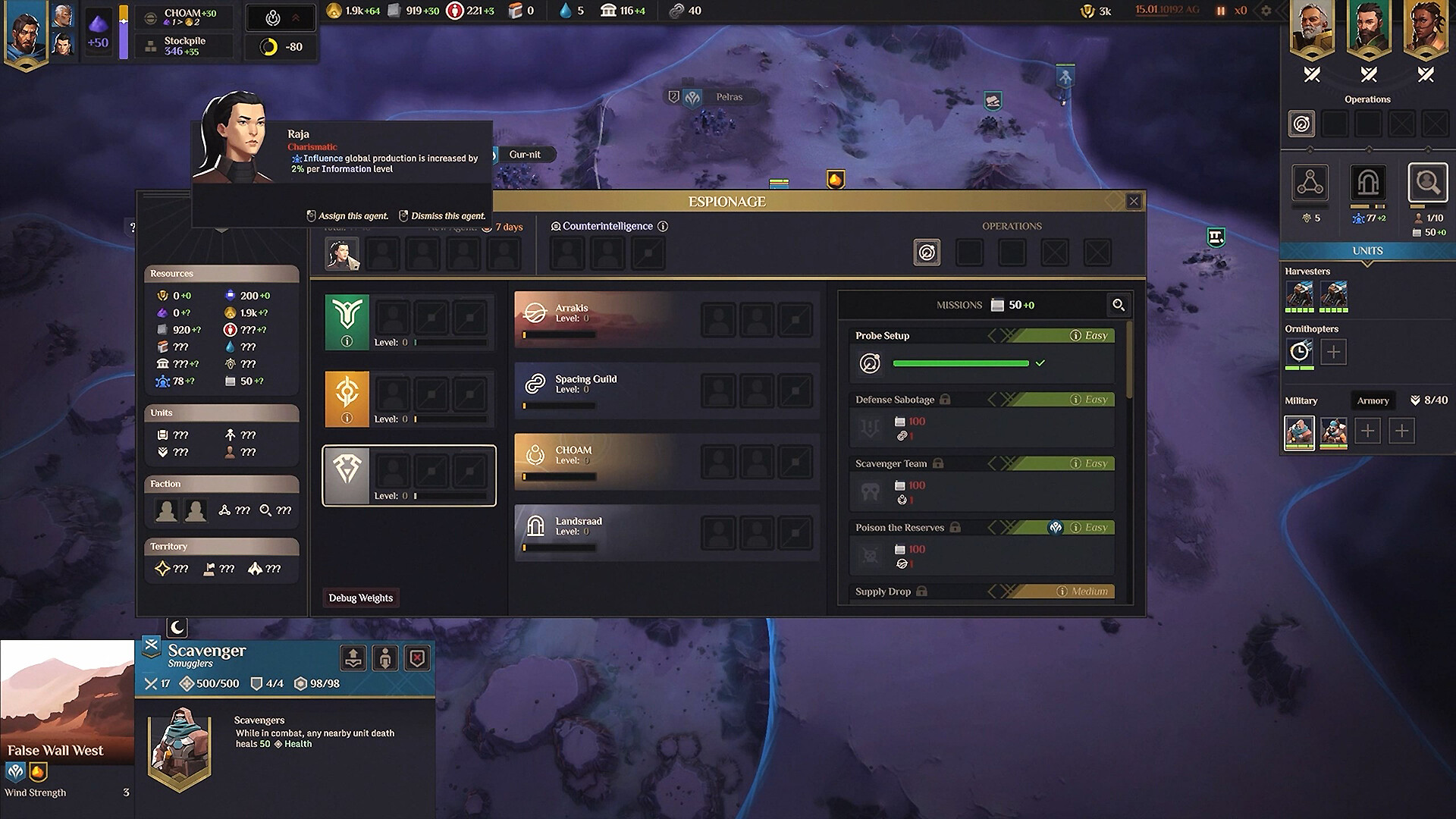
Despite having structured battles like a more traditional RTS, Dune: Spice Wars offers a fairly shallow combat experience. Though units can be customized, micromanagement is minimal, rarely demanding more from the player than the occasional attempt to keep your long-range units out of the way of the enemy while attempting to tie up enemy ranged fighters with your own melee specialists.
Though army composition is important, battles will mostly consist of units hitting each other until one side either pulls back or is annihilated. While more complex flanking actions and maneuvers are technically possible, they factor into engagements extremely rarely. Battles unfold as you’d expect and, given the generous amount of fighting that occurs over an average game of Dune: Spice Wars, this predictability is certainly a disappointment.
Hatching a plan
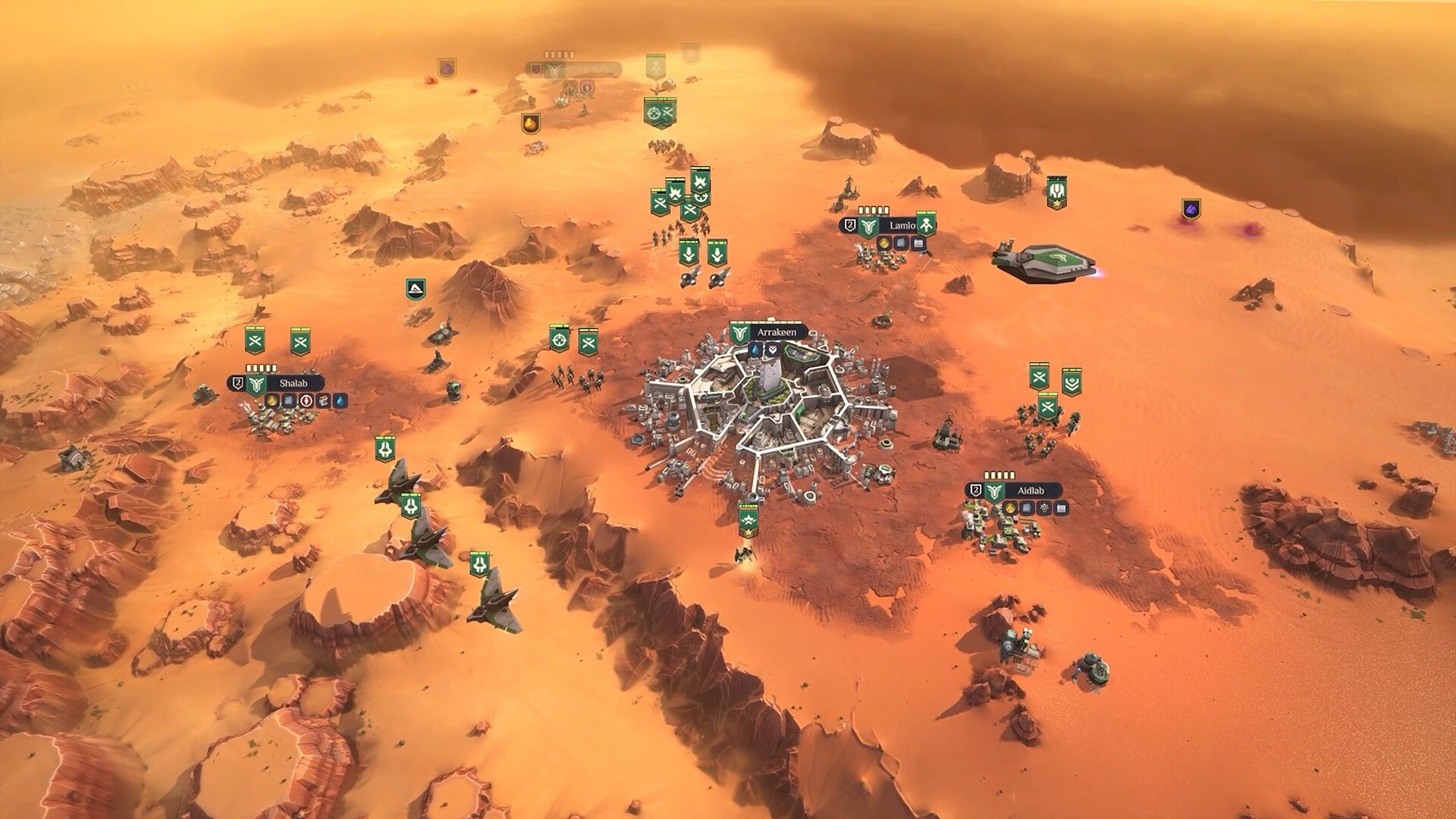
Despite these downsides, however, Dune: Spice Wars demonstrates that a mastery of strategy game fundamentals goes a long way toward creating a fulfilling experience. Since matches last several hours, they become bite-sized, mini-campaigns, completable in a single sitting. There’s something pleasant about this pacing - reminiscent of many of the best board games in terms of duration and appeal.
Spice Wars procedurally assembles maps out of tiles, with each region possessing its own qualities. Even the villages necessary to control these areas come with unique traits, putting pressure on you to build in a certain way. This pressure might conflict with one of your ongoing goals. It’s here that the friction of Spice Wars rears its head - a quality that has kept me coming back despite the shortcomings.
The factions do add a significant degree of replayability while forcing you to alter your playstyle to fit their special mechanics
The game’s six factions, too, come in a range of different flavors. The noble House Atreides takes on the role of reasonable protagonists, boasting special mechanics that allow them to ally with the local Fremen population. On the other side of the fence, you have House Harkonen who gain benefits from the militarization and brutalization of their subjects. Perhaps the most novel of all is House Ecaz, which builds artistic monuments and creates sanctuaries by placing neutral settlements under its protection. The factions do add a significant degree of replayability while forcing you to alter your playstyle (sometimes radically) to fit their special mechanics.
Those who are looking for a short-form sci-fi strategy fix steeped in rich, immersive lore could do worse than Dune: Spice Wars. However, should you be looking for meaty long-term campaigns or more complex battles, Shiro’s strategy offering is unlikely to satisfy your appetite.
Accessibility
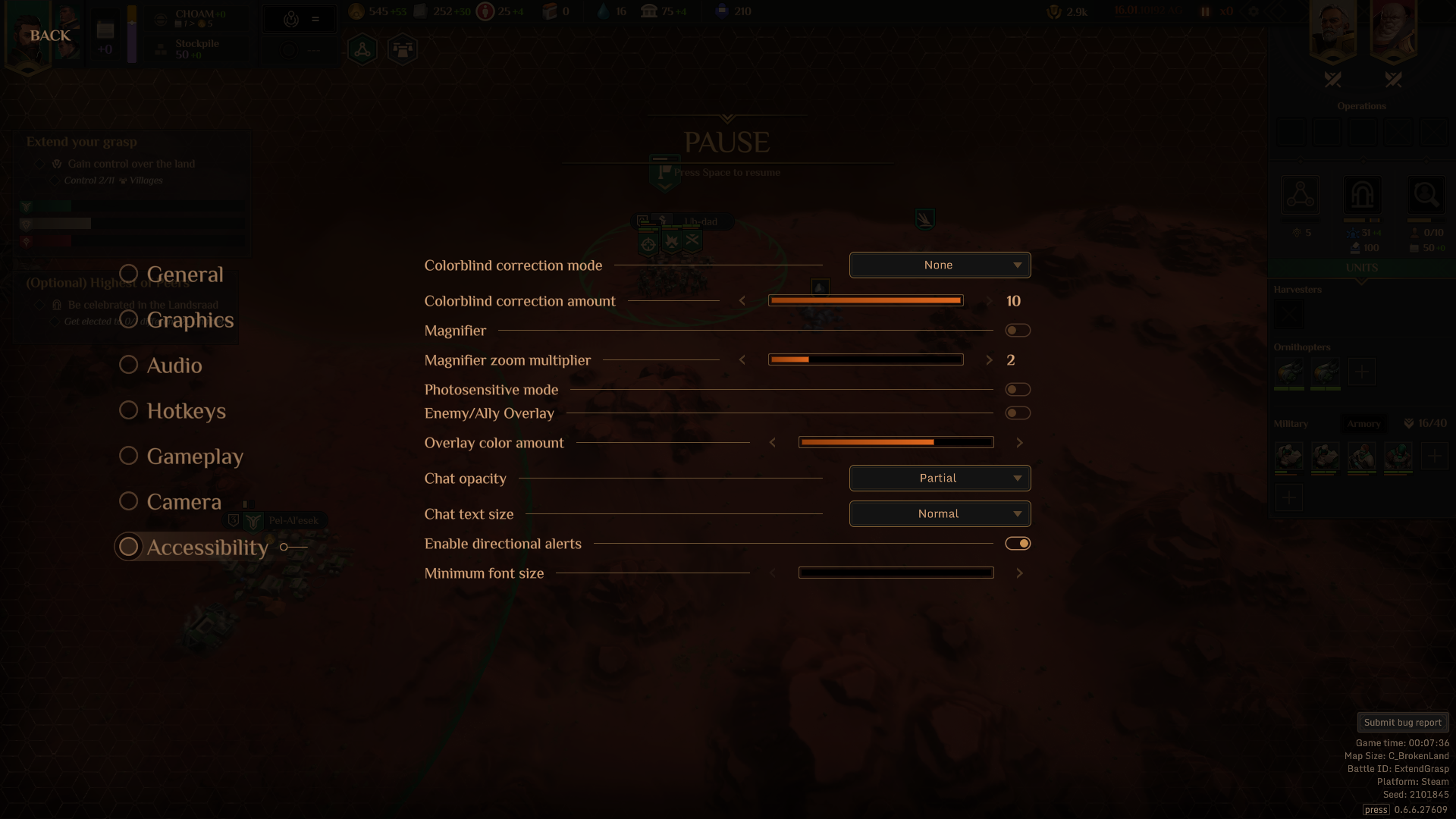
Dune: Spice Wars puts real thought into accessibility, offering special modes for colorblind and photosensitive players. The game also allows you to use a magnifier to help read small text, while also allowing you to adjust text size and enable directional alerts.
How we reviewed Dune: Spice Wars
I played 15 hours of Dune: Spice Wars, spending time with 1v1, 4v4, and conquest modes as a range of available factions. Over the course of several games, I used a variety of different builds and play styles, testing out the game’s political, espionage, military, and economic systems.
I am a very experienced strategy game and RTS player with thousands of hours logged across Stellaris, Starcraft 2, Crusader Kings 3, and Total War: Warhammer. My experience with many of the best PC strategy games proved invaluable when putting together this review.
Want to take your strategies to the real world? Check out our lists of the best classic board games as well as the best board games for adults.

An editor and freelance journalist, Cat Bussell has been writing about video games for more than four years and, frankly, she’s developed a taste for it. As seen on TechRadar, Technopedia, The Gamer, Wargamer, and SUPERJUMP, Cat’s reviews, features, and guides are lovingly curated for your reading pleasure.
A Cambridge graduate, recovering bartender, and Cloud Strife enjoyer, Cat’s foremost mission is to bring you the best coverage she can, whether that’s through helpful guides, even-handed reviews, or thought-provoking features. She’s interviewed indie darlings, triple-A greats, and legendary voice actors, all to help you get closer to the action. When she’s not writing, Cat can be found sticking her neck into a fresh RPG or running yet another Dungeons & Dragons game.
